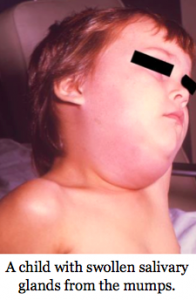
Virus: Mumps Virus, a paramyxovirus
Vaccine: MMR or MMRV
Transmission:
Mumps is extremely contagious and passed through coughs, sneezes, and contaminated objects. Because up to half of those infected with mumps don’t show symptoms (or have very mild symptoms), this virus can be carried and spread like wildfire.

Symptoms:
The mumps virus usually begins with a fever lasting for a few days, coupled with headache, muscle aches, tiredness, and loss of appetite. Following this, are swollen and tender salivary glands (under the ears on one or both sides of the neck)—the characteristic swollen cheeks and jaw.
(Learn about the mumps pickle test, here.)
Who is at Risk:
Since most children have been vaccinated with the MMR vaccine, the mumps is a rare disease in the US.2 However, there has been a recent rise in unvaccinated children in the US, leading to several outbreaks of the mumps. According to the CDC, in 2006 there were 6,584 cases of the mumps across several states, mostly occurring in college dormitories.2
Of course, those who are immunocompromised due to illness and are unable to get vaccinated are at risk for contracting the measles, as are small children.
Possible Complications:
In serious cases, the mumps can cause complications such as:
- Inflammation of the testicles in males who have reached puberty. This is the most common complication, and rarely leads to fertility problems.2
- Inflammation of the brain and/or tissue covering the brain and spinal cord
- Inflammation of the ovaries and/or breasts in females who have reached puberty
- Deafness
Pregnancy/Unborn Child/Newborn Risk:
Infection with the mumps in the first trimester of pregnancy can result in miscarriage. However, contracting the mumps during pregnancy generally does not cause malformations to the child.2
Prevention:
As mentioned above, the mumps is EXTREMELY contagious. If your child remains unvaccinated and contracts the mumps, the CDC recommends keeping your child isolated from others for about a week after the swelling begins in your child’s face.
To prevent the spread of the mumps, teach children to wash their hands often, to not share eating and drinking utensils, and to cover their mouth when coughing and sneezing. Also, regularly clean objects such as toys, and minimize contact with those who are sick with the mumps.
Treatment:
If your child contracts a mild case of the mumps, he would most likely recover in a week or two. There is no treatment for the mumps, and you have to let it run it’s course.
Prognosis:
The majority of those who contract the mumps survive. The risk of death or complications is higher in those who are immunocompromised due to cancer, HIV, or steroid use.
Resources:
- Medline Plus. U.S. National Library of Medicine. www.nlm.nih.gov
- Centers for Disease Control and Prevention (CDC). www.cdc.gov
- National Institutes of Health. www.nih.gov
- Kids Health. Nemours. www.kidshealth.org
- The history of Vaccines. www.historyofvaccines.org
- National Institute of Neurological Disorders and Stroke. www.ninds.nih.gov
Photo courtesy of the CDC. www.cdc.gov
